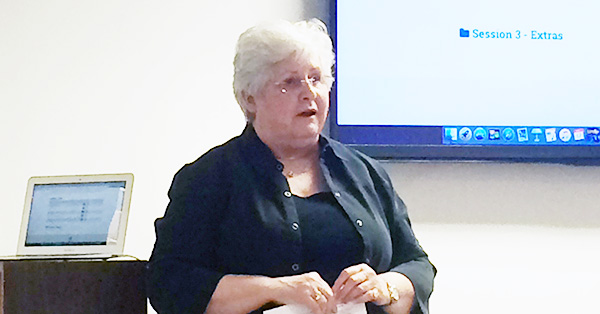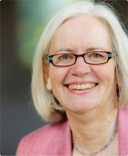By Ken Camp and Jeff Brumley
Theological education should help “the whole people of God” move toward maturity as the body of Christ — and that means moving beyond traditional ways of providing that learning, Linda Cannell said during B.H. Carroll Theological Institute’s recent fall colloquy.

“The conventional theological curriculum — now generally considered to be hopelessly overcrowded with courses and programs — and an instructional design that is held captive by schedules and the pressures to get courses done are just not adequate for the sort of formation that is required of pastoral leadership,” said Cannell, an educational specialist with North Park Theological Seminary in Chicago.
“The theological curriculum, then, must accomplish more than to teach leaders how to build competency in organizational management applied to churches,” she said.
‘Good luck with that’
Both formal education and informal learning initiatives can flourish around a vision of theological education for the whole people of God, she said.
The leaders of other Baptist seminaries said they agree theological education must also serve churches. But some said doing that, and paying the bills, can be a challenge. Some suggested Cannell’s vision is already being accomplished.
“It’s popular to say theological education needs to change,” said Ron Crawford, president of the Baptist Theological Seminary at Richmond in Virginia. “Well, good luck with that.”

Crawford and other seminary leaders interviewed by Baptist News Global said their schools have been challenged to find a way to offer theological education and training to churches in a way that does not put a financial strain on their institutions.
As a whole, they have organized weekend retreats, visiting scholar programs, short-term certification programs and access to classes both on campus and online. But often when grants and other funding run out for these programs, they have to be cut.
“The seminary has no money to do these kind of programs,” Crawford said.
‘Service to the church’
The need to provide theological education to the wider church is a part of every seminary’s calling and cannot be ignored, said Andrew Wakefield, dean of Campbell University Divinity School in Buies Creek, N.C.
“Part of what makes us authentic, relevant and useful is that we are willing to give ourselves away, to give ourselves in service to the church,” Wakefield said.

The flip side, he said, is financial reality.
“We actually have to pay the bills, so we are trying to figure out how to balance that,” he said. “The problem is nobody is paying us to do that.”
What does pay the bills, he added, is the traditional classroom, curriculum and degree. Yet they also continue to offer lecture series, mini-sabbaticals and free auditing of classes.
“I think that’s a dilemma we haven’t figured out yet,” Wakefield said.
Letting pastors teach
And the truth is that seminaries have been changing — they always have, said Gail O’Day, dean of the Wake Forest University School of Divinity in Winston-Salem, N.C.
That seminary has recently required all students take classes in areas like gender, plurality, race, class, health and ecological issues, among others, to help form ministers versed in social issues.
This enables those future ministers in turn to educate their congregations and ministries in ways that are most relevant and needed, O’Day said.
“Those are the contemporary issues where the church needs to have a witness,” she said.

Some evidence suggests this is how many churches want to receive their theological education, Crawford said.
While BTSR offers shortened degree and certification programs tailored to churches, that is not where local church members want to get their education, he said.
“For theological education, the person in the local church is almost never looking to the seminary for that,” Crawford said.
What they want, he said, is for their own pastors and other ministers to provide it.
“Church members know and trust the pastor of the church and are glad to learn from them on a Wednesday night or a Saturday morning,” Crawford said.
Becoming the people of God
The motivation for changes to theological education is rooted in a wider understanding of church.
“There is a difference between the church as institution and the church as the mystery of God — the people of God,” Cannell said. “We need solid organizational structures, but that is not all the church is.”
If the church fails to “deal with mystery,” it becomes subject to the same vulnerabilities common to all institutions, she noted. But by opening itself to the mystery of God, churches gain access to grace, redemption, hope and the gifts of the Spirit, she said.
“If we lose the mystery, we’ve lost everything,” Cannell said.
Churches need to recognize the difference between institutional success and helping members live authentically as the people of God.
When churches focus on becoming the people of God, they are free to ask about organizational processes that help the congregation foster awareness of identity, encourage reflection and provide opportunities for members to embody God’s character — not just focus on content delivery.
“We have accepted as normative models of organization that often do little to help congregations become the people who demonstrate the character and behavior God expects,” she said.
“The notion that we have to ask different questions, allow time for character to develop and give priority to spiritual over institutional goals seems idealistic in the extreme,” she added. “Yet understanding their identity and purpose as the people of God — and learning to live authentically in relation to that understanding — are non-negotiable outcomes for the people of God.”
